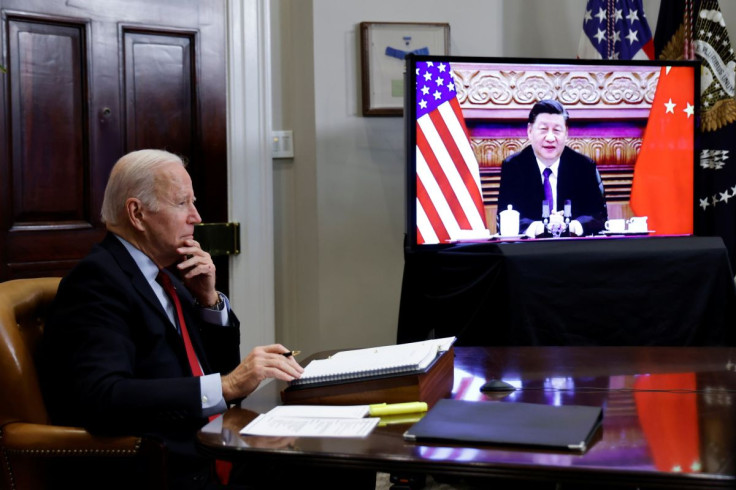In Call With Biden, China's Xi Warns Against 'Playing With Fire' Over Taiwan

Chinese President Xi Jinping on Thursday warned U.S. President Joe Biden against "playing with fire" over Taiwan, as concerns mounted over a possible visit to the Chinese-claimed island by U.S. House Speaker Nancy Pelosi.
Chinese state media said Xi told Biden in their fifth call as leaders that the United States should abide by the "one-China principle" and stressed that China firmly opposed Taiwanese independence and interference of external forces.
Biden told Xi that U.S. policy on Taiwan had not changed and that the United States strongly opposes unilateral efforts to change the status quo or undermine peace and stability across the Taiwan Strait - a reference to the 100-mile-wide body of water separating the island from the mainland, a White House statement said.
While highligting Taiwan, Xi also stressed that the two sides needed to maintain communication on macroeconomic policies, global supply chains, and safeguarding global food and energy security, Chinese state media said.
Beijing has issued escalating warnings about repercussions should Pelosi - a Democrat like Biden - visit Taiwan, which says it is facing increasing Chinese military and economic threats. A visit by the House speaker would be a dramatic, though not unprecedented, show of U.S. support for the island.
"Those who play with fire will only get burnt," Chinese state media quote Xi as telling Biden. "(We) hope the U.S. side can see this clearly."
The White House readout said the two leaders also discussed a range of other issues, including climate change and health security.
China has given few clues to specific responses it might make if Pelosi, a long-time critic of Beijing, particularly on human rights issues, makes the trip. Pelosi had yet to confirm the trip.
The presidents' call lasted over two hours. U.S. officials had said it would have a broad agenda, including discussion of Russia's invasion of Ukraine, which China has yet to condemn.
At its core though, U.S. officials said they saw the exchange as another chance to manage competition between the world's two largest economies, whose ties have been increasingly clouded by tensions over democratically governed Taiwan, which Xi has vowed to reunite with the mainland, by force if necessary.
Washington does not have official relations with Taiwan and follows a "one-China policy" that recognizes Beijing, not Taipei, diplomatically. But it is obliged by U.S. law to provide the island with the means to defend itself, and pressure has been mounting in Congress for more explicit support.
"The call was a part of the Biden Administration's efforts to maintain and deepen lines of communication between the United States and the PRC and responsibly manage our differences and work together where our interests align," the White House said.
One person briefed on planning for the call said the Biden administration thinks leader-to-leader engagement is the best way to lower tensions over Taiwan.
Some analysts believe Xi also has an interest in avoiding escalation as he seeks an unprecedented third term in office at a congress of China's ruling Communist Party expected in the fall. However others say playing up the Taiwan issue could serve Xi as a domestic distraction from China's slowing economy.
Both countries have faced economic difficulties this year. China's $18 trillion economy has been battered by its strict domestic COVID regulations and full lockdowns of cities like Shanghai, while the United States is battling surging inflation amid concerns of a recession.
China's state media said on Thursday the country will try hard to achieve the best possible results for the economy this year, dropping previous calls that it will strive to meet its 2022 growth target. This followed a high-level Communist Party meeting chaired by Xi.
"Attempts at decoupling or severing supply chains in defiance of underlying patterns would not help boost the U.S. economy. They would only make the world economy more vulnerable," Xi said, referring to U.S. efforts to end reliance on China for strategic goods.
As well as climate and economic issues, Biden had been keen in the call to discuss the idea of placing a price cap on Russian oil to punish Moscow for its war in Ukraine, which Treasury Secretary Janet Yellen raised with Chinese counterparts earlier this month, the person who was briefed said.
The Biden administration has been debating whether to lift some tariffs on Chinese goods as a way to ease soaring inflation, but U.S. officials said a decision was not expected ahead of the call.
When Biden last spoke to Xi in March, he warned of "consequences" if Beijing gave material support for Russia's war, and the U.S. government believes that that red line has not been crossed in the months since.
Taiwan has complained of stepped-up Chinese military maneuvers over the past two years to try and force it to accept Beijing's sovereignty. Just ahead of Thursday's call, Taiwan's military said it fired flares to warn away a drone that "glanced by" a strategically located and heavily fortified island close to the Chinese coast that was possibly probing its defenses.
The last time a speaker of the U.S. House visited Taiwan was in 1997, and as a co-equal branch of government, the U.S. executive has little control over congressional travel.
China has grown more powerful militarily and economically since, and some analysts worry such a visit at a time of fraught ties could spur a crisis across the 100-mile (160-km) wide Taiwan Strait waterway separating China and Taiwan.
The White House says the administration has been in touch with Pelosi's office to make sure she has "all the context" she needs to make decisions about her travel.
© Copyright Thomson Reuters 2024. All rights reserved.





















